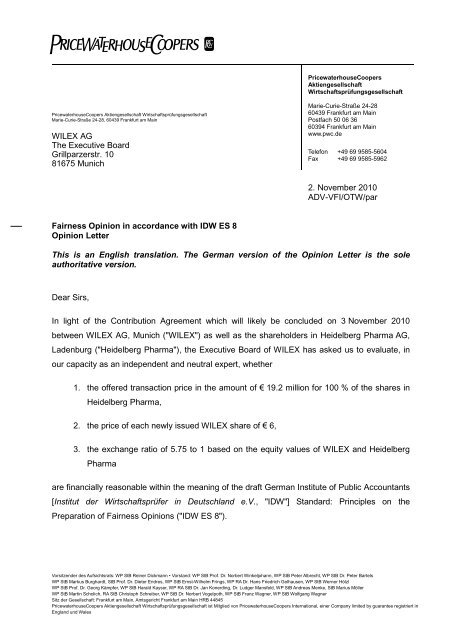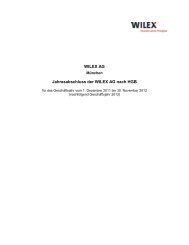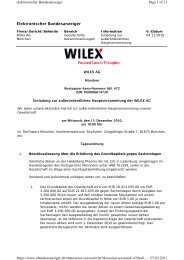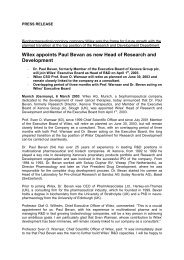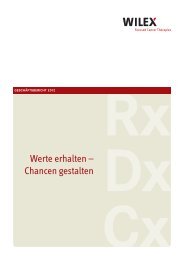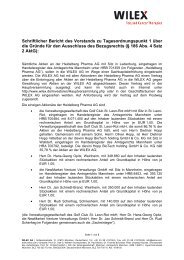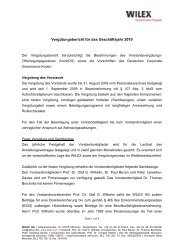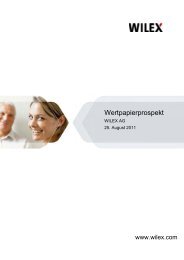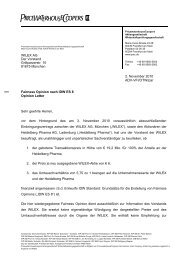PwC Brief - Wilex
PwC Brief - Wilex
PwC Brief - Wilex
Create successful ePaper yourself
Turn your PDF publications into a flip-book with our unique Google optimized e-Paper software.
PricewaterhouseCoopers Aktiengesellschaft Wirtschaftsprüfungsgesellschaft<br />
Marie-Curie-Straße 24-28, 60439 Frankfurt am Main<br />
WILEX AG<br />
The Executive Board<br />
Grillparzerstr. 10<br />
81675 Munich<br />
Fairness Opinion in accordance with IDW ES 8<br />
Opinion Letter<br />
PricewaterhouseCoopers<br />
Aktiengesellschaft<br />
Wirtschaftsprüfungsgesellschaft<br />
Marie-Curie-Straße 24-28<br />
60439 Frankfurt am Main<br />
Postfach 50 06 36<br />
60394 Frankfurt am Main<br />
www.pwc.de<br />
Telefon +49 69 9585-5604<br />
Fax +49 69 9585-5962<br />
2. November 2010<br />
ADV-VFI/OTW/par<br />
This is an English translation. The German version of the Opinion Letter is the sole<br />
authoritative version.<br />
Dear Sirs,<br />
In light of the Contribution Agreement which will likely be concluded on 3 November 2010<br />
between WILEX AG, Munich ("WILEX") as well as the shareholders in Heidelberg Pharma AG,<br />
Ladenburg ("Heidelberg Pharma"), the Executive Board of WILEX has asked us to evaluate, in<br />
our capacity as an independent and neutral expert, whether<br />
1. the offered transaction price in the amount of € 19.2 million for 100 % of the shares in<br />
Heidelberg Pharma,<br />
2. the price of each newly issued WILEX share of € 6,<br />
3. the exchange ratio of 5.75 to 1 based on the equity values of WILEX and Heidelberg<br />
Pharma<br />
are financially reasonable within the meaning of the draft German Institute of Public Accountants<br />
[Institut der Wirtschaftsprüfer in Deutschland e.V., "IDW"] Standard: Principles on the<br />
Preparation of Fairness Opinions ("IDW ES 8").<br />
Vorsitzender des Aufsichtsrats: WP StB Reiner Dickmann • Vorstand: WP StB Prof. Dr. Norbert Winkeljohann, WP StB Peter Albrecht, WP StB Dr. Peter Bartels<br />
WP StB Markus Burghardt, StB Prof. Dr. Dieter Endres, WP StB Ernst-Wilhelm Frings, WP RA Dr. Hans Friedrich Gelhausen, WP StB Werner Hölzl<br />
WP StB Prof. Dr. Georg Kämpfer, WP StB Harald Kayser, WP RA StB Dr. Jan Konerding, Dr. Ludger Mansfeld, WP StB Andreas Menke, StB Marius Möller<br />
WP StB Martin Scholich, RA StB Christoph Schreiber, WP StB Dr. Norbert Vogelpoth, WP StB Franz Wagner, WP StB Wolfgang Wagner<br />
Sitz der Gesellschaft: Frankfurt am Main, Amtsgericht Frankfurt am Main HRB 44845<br />
PricewaterhouseCoopers Aktiengesellschaft Wirtschaftsprüfungsgesellschaft ist Mitglied von PricewaterhouseCoopers International, einer Company limited by guarantee registriert in<br />
England und Wales
Page 2/8<br />
The Fairness Opinion stated here serves exclusively the information of the Executive Board of<br />
WILEX. It does not replace any independent evaluation of the stated prices and the exchange<br />
ratio by the corporate bodies of WILEX. This Fairness Opinion contains no recommendation on<br />
carrying out or refraining from the transaction. This Fairness Opinion also does not address the<br />
issue of whether the terms and conditions of the transaction comply with the legal requirements.<br />
Our task is exclusively to address the reasonableness of the stated prices and the exchange<br />
ratio in financial terms on the basis of the activities described in this Fairness Opinion.<br />
Our activity did not involve the audit or an audit review of the information submitted to us by<br />
WILEX, Heidelberg Pharma or third parties.<br />
We wish to point out that we are not receiving any compensation for our services rendered in<br />
connection with this transaction which is based on conclusion of the transaction. Furthermore,<br />
we wish to point out that we have not rendered any advisory services for the bidder in the course<br />
of this transaction.<br />
Our mandate with WILEX is subject to the attached General Engagement Terms for<br />
Wirtschaftsprüfer and Wirtschaftsprüfungsgesellschaften (German Public Auditors and Public<br />
Audit Firms) as of 1 January 2002.<br />
1. Reasonableness within the meaning of this Fairness Opinion<br />
In accordance with IDW ES 8, financial reasonableness exists if the transaction price for<br />
Heidelberg Pharma, the price for each newly issued WILEX share as well as the enterprise<br />
value of WILEX and Heidelberg Pharma used as a basis for calculating the exchange ratio lie<br />
within a range of comparable prices.<br />
2. Effective Date of the analysis<br />
The effective date of the analysis is 31 October 2010 (the "Effective Date").<br />
3. Performance of the Mandate and information used as a basis<br />
We carried out our work between 11 October 2010 and 29 October 2010 in our offices in<br />
Frankfurt am Main and Munich.<br />
The following documents were provided to us as the primary documents:<br />
...
Documents from Heidelberg Pharma:<br />
• short presentation "Projekt Marsilius" of Heidelberg Pharma dated September 2010,<br />
Page 3/8<br />
• mid-term planning of Heidelberg Pharma with the planned P&L, the planned balance<br />
sheet, the planned cash-flow statement for the fields of ADC and Services as well as the<br />
consolidated view for the years 2010 through 2014 dated October 2010,<br />
• project planning of Heidelberg Pharma dated October 2010,<br />
• business plan and documentation of Heidelberg Pharma for the project CapStem dated<br />
May 2010 as well as October 2010,<br />
• presentation on the business plan of Heidelberg Pharma dated October 2010,<br />
• audit reports for Heidelberg Pharma under the German Commercial Code<br />
[Handelsgesetzbuch, "HGB"] (audited by Ernst & Young GmbH<br />
Wirtschaftsprüfungsgesellschaft, Stuttgart) for the years 2004 through 2009.<br />
Documents for WILEX:<br />
• planning by WILEX on the development projects RENCAREX®, REDECTANE® as well as<br />
MESUPRON®, in each case dated October 2010,<br />
• planning of administrative costs for WILEX dated October 2010,<br />
• annual reports of WILEX under IFRS (audited by KPMG AG<br />
Wirtschaftsprüfungsgesellschaft, Berlin ("KPMG")) for the years 2007 through 2009,<br />
• audit reports by KPMG on the individual financial statements of WILEX under IFRS for the<br />
years 2007 through 2009,<br />
• Fairness Opinion by TransAct Advisory Services GmbH & Co. KG, Berlin, which was<br />
prepared in connection with the joint statement by the Executive Board and the<br />
Supervisory Board of WILEX on the public mandatory offer of 29 July 2010.<br />
To the extent not stated otherwise, the above documents were provided to us by WILEX.<br />
In addition, we have taken into account the following publicly available information for our work:<br />
...
Page 4/8<br />
• stock exchange prices and analysts estimates for WILEX as well as for peer group<br />
companies from the financial information service provider Bloomberg L.P., New York,<br />
USA,<br />
• annual reports as well as other publications on the peer group companies from the<br />
respective internet sites of the companies,<br />
• market studies on the relevant market for Heidelberg Pharma and WILEX.<br />
During the course of carrying out the mandate, we conducted various discussions with the<br />
Executive Board of WILEX and the contact partners on the side of WILEX designated by the<br />
Executive Board as the persons responsible for the project and with the Executive Board of<br />
Heidelberg Pharma. The main emphasis of the discussions involved especially their views of<br />
the course of business to date as well as the future developments for WILEX and Heidelberg<br />
Pharma.<br />
In addition, we have analyzed the documents relevant for the transaction which were provided to<br />
us by the Executive Board of Heidelberg Pharma, and we have reviewed select documents. In<br />
parallel with this, we also carried out our own research in the area of publicly available data for<br />
purposes of our analyses.<br />
Our analysis of the stated prices and the exchange ratio is based in general on the documents<br />
provided for this purpose by the Executive Board of WILEX and the Executive Board of<br />
Heidelberg Pharma. No independent financial, legal, operational or tax due diligence was<br />
carried out by us.<br />
We wish to point out that the planning, the underlying premises and the objectivity of these<br />
factors lie exclusively in the responsibility of the Executive Board of WILEX.<br />
The Executive Board of WILEX issued to us on 29 October 2010 a letter of representation<br />
confirming that all information relevant for this Fairness Opinion was provided to us completely<br />
and correctly. When preparing this Fairness Opinion, we have assumed the accuracy and<br />
completeness of this information and have neither conducted a verification of the used data and<br />
information with regard to accuracy and completeness, nor have we verified the reliability of the<br />
sources of the information.<br />
...
Page 5/8<br />
4. Standards for evaluating the financial reasonableness of the offered price within the<br />
meaning of this Fairness Opinion<br />
4.1. Approach<br />
Financial reasonableness within the meaning of this Fairness Opinion exists if the transaction<br />
price and the offered consideration lie within a range of comparable prices (function as a<br />
standard for measurement). To the extent that no directly observable comparable prices exist,<br />
e.g. competing offers for shares in WILEX or Heidelberg Pharma, the standards for evaluation<br />
must be developed indirectly using valuation methods, market price oriented methods and other<br />
information from the capital market and the transaction market.<br />
In order to determine the range of transaction prices used as a comparison which formed the<br />
basis for evaluating reasonableness, we have applied the following methods:<br />
4.2. Methods based on value of capital<br />
4.2.1. DCF method<br />
It is generally recognized in economic theory and international valuation practice that the value<br />
based on the discounted cash flow method (DCF method) or the discounted earnings method is<br />
a suitable measurement for the value of an enterprise.<br />
In the present case, the relevant range of comparable prices under the DCF method was<br />
determined because in the case of the same assumptions for purposes of valuation, especially<br />
with regard to the financing, both methods lead to the same ranges of comparable prices.<br />
Therefore, the discounted earnings method was not used.<br />
When applying the DCF method, the relevant standard for evaluation is determined by<br />
discounting the cash flows. We considered the relevant cash flows to be those cash flows<br />
derived from the corporate planning to which all parties providing capital are entitled (gross<br />
method).<br />
The starting point for determining the financial surpluses consisted of the business and project<br />
planning of Heidelberg Pharma and WILEX provided to us. We have analyzed the planning in<br />
accordance with the IDW ES 8.<br />
...
Page 6/8<br />
In the context of discounting, the future expected surpluses are discounted as of the Effective<br />
Date by using an appropriate interest rate. The capitalization interest rate represents the return<br />
on investment from an alternative investment comparable to an investment in the enterprise<br />
being valued if this alternative investment is equivalent with regard to timing, risk and taxation<br />
when compared to the cash flow to be capitalized.<br />
4.3. Market price oriented method<br />
We have applied multiplier methods as market price oriented methods for individual fields of<br />
business in Heidelberg Pharma on the basis of key numbers from comparable, listed enterprises<br />
(so-called trading multipliers) and on the basis of key numbers of comparable corporate shares<br />
recently involved in transactions (so-called transaction multipliers).<br />
4.3.1. Trading multipliers<br />
When applying the methods for determining price based on key numbers of comparable, listed<br />
enterprises, the comparable price is determined as the product of profits considered to be<br />
representative and sustained for the company multiplied by the earnings multiplier for the peer<br />
group enterprises. The multiplier is determined on the basis of the ratio of the market price to<br />
the amount of profit in the peer group enterprises.<br />
4.3.2. Transaction multipliers<br />
When applying the method for determining price based on key numbers of comparable, recently<br />
traded enterprises or shares in enterprises, the transaction price results as the product of<br />
multiplying the profits of Heidelberg Pharma considered to be representative and sustainable<br />
with the multiplier determined on the basis of the ratio of the corresponding purchase prices to<br />
various key numbers for earnings.<br />
4.4. Other information relating to the capital markets and the transaction market<br />
As a supplement, we have analyzed the following additional information related to the capital<br />
markets and the transaction markets.<br />
4.2.1. Stock exchange price<br />
We analyzed the stock exchange price for the shares in WILEX as additional information related<br />
to the capital markets.<br />
...
Page 7/8<br />
Special factors which could influence the course of the price were considered in the analysis.<br />
4.2.2. Statements by financial analysts / target share prices<br />
We also analyzed as further information the target prices published by financial analysts with<br />
regard to the stock exchange prices in the shares of WILEX in the period of November 2009<br />
through October 2010.<br />
...
5. Concluding statement<br />
Page 8/8<br />
On the basis of the activities we carried out in accordance with the IDW ES 8, we are of the view<br />
that<br />
• the offered transaction price in the amount of € 19.2 million for 100 % of the shares in<br />
Heidelberg Pharma,<br />
• the price of € 6 per share for each newly issued WILEX share,<br />
• the exchange ratio of 5.75 to 1 based on the equity values of WILEX AG and<br />
Heidelberg Pharma<br />
are financially reasonable within the meaning of the IDW ES 8.<br />
This Fairness Opinion serves exclusively the information of the Executive Board of WILEX. It<br />
does not replace any independent evaluation of the stated prices and the exchange ratio by the<br />
corporate bodies of WILEX. This Fairness Opinion contains no recommendation about carrying<br />
out or refraining from the transaction.<br />
Yours sincerely,<br />
PricewaterhouseCoopers<br />
Aktiengesellschaft<br />
Wirtschaftsprüfungsgesellschaft<br />
Frankfurt am Main<br />
Dr. Volker Fitzner ppa. Oliver Twelsiek<br />
Enclosure<br />
General Engagement Terms for Wirtschaftsprüfer and Wirtschaftsprüfungsgesellschaften<br />
(German Public Auditors and Public Audit Firms) as of 1 January 2002
All rights reserved. This form may not be reprinted, either in whole or in part, or copied<br />
in any manner, without the express written consent of the publisher.<br />
© IDW Verlag GmbH · Tersteegenstraße 14 · D-40474 Düsseldorf<br />
General Engagement Terms<br />
for<br />
Wirtschaftsprüfer and Wirtschaftsprüfungsgesellschaften<br />
[German Public Auditors and Public Audit Firms]<br />
as of January 1, 2002<br />
This is an English translation of the German text, which is the sole authoritative version<br />
1. Scope<br />
(1) These engagement terms are applicable to contracts between Wirtschaftsprüfer<br />
[German Public Auditors] or Wirtschaftsprüfungsgesellschaften<br />
[German Public Audit Firms] (hereinafter collectively referred to as the<br />
“Wirtschaftsprüfer”) and their clients for audits, consulting and other engagements<br />
to the extent that something else has not been expressly agreed to in<br />
writing or is not compulsory due to legal requirements.<br />
(2) lf, in an individual case, as an exception contractual relations have also<br />
been established between the Wirtschaftsprüfer and persons other than the<br />
client, the provisions of No. 9 below also apply to such third parties.<br />
2. Scope and performance of the engagement<br />
(1) Subject of the Wirtschaftsprüfer’s engagement is the performance of agreed<br />
services – not a particular economic result. The engagement is performed in<br />
accordance with the Grundsätze ordnungsmäßiger Berufsausübung<br />
[Standards of Proper Professional Conduct]. The Wirtschaftsprüfer is entitled to<br />
use qualified persons to conduct the engagement.<br />
(2) The application of foreign law requires – except for financial attestation<br />
engagements – an express written agreement.<br />
(3) The engagement does not extend – to the extent it is not directed thereto –<br />
to an examination of the issue of whether the requirements of tax law or special<br />
regulations, such as, for example, laws on price controls, laws limiting<br />
competition and Bewirtschaftungsrecht [laws controlling certain aspects of<br />
specific business operations] were observed; the same applies to the<br />
determination as to whether subsidies, allowances or other benefits may be<br />
claimed. The performance of an engagement encompasses auditing<br />
procedures aimed at the detection of the defalcation of books and records and<br />
other irregularities only if during the conduct of audits grounds therefor arise or<br />
if this has been expressly agreed to in writing.<br />
(4) If the legal position changes subsequent to the issuance of the final<br />
professional statement, the Wirtschaftsprüfer is not obliged to inform the client<br />
of changes or any consequences resulting therefrom.<br />
3. The client’s duty to inform<br />
(1) The client must ensure that the Wirtschaftsprüfer – even without his special<br />
request – is provided, on a timely basis, with all supporting documents and<br />
records required for and is informed of all events and circumstances which may<br />
be significant to the performance of the engagement. This also applies to those<br />
supporting documents and records, events and circumstances which first<br />
become known during the Wirtschaftsprüfer’s work.<br />
(2) Upon the Wirtschaftsprüfer’s request, the client must confirm in a written<br />
statement drafted by the Wirtschaftsprüfer that the supporting documents<br />
and records and the information and explanations provided are complete.<br />
4. Ensuring independence<br />
The client guarantees to refrain from everything which may endanger the<br />
independence of the Wirtschaftsprüfer’s staff. This particularly applies to<br />
offers of employment and offers to undertake engagements on one’s own<br />
account.<br />
5. Reporting and verbal information<br />
lf the Wirtschaftsprüfer is required to present the results of his work in writing,<br />
only that written presentation is authoritative. For audit engagements the longform<br />
report should be submitted in writing to the extent that nothing else has<br />
been agreed to. Verbal statements and information provided by the<br />
Wirtschaftsprüfer’s staff beyond the engagement agreed to are never binding.<br />
6. Protection of the Wirtschaftsprüfer’s intellectual property<br />
The client guarantees that expert opinions, organizational charts, drafts,<br />
sketches, schedules and caIculations – expecially quantity and cost<br />
computations – prepared by the Wirtschaftsprüfer within the scope of the<br />
engagement will be used only for his own purposes.<br />
[Translator’s notes are in square brackets]<br />
7. Transmission of the Wirtschaftsprüfer’s professional statement<br />
(1) The transmission of a Wirtschaftsprüfer’s professional statements (longform<br />
reports, expert opinions and the like) to a third party requires the<br />
Wirtschaftsprüfer’s written consent to the extent that the permission to<br />
transmit to a certain third party does not result from the engagement terms.<br />
The Wirtschaftsprüfer is liable (within the limits of No. 9) towards third parties<br />
only if the prerequisites of the first sentence are given.<br />
(2) The use of the Wirtschaftsprüfer’s professional statements for promotional<br />
purposes is not permitted; an infringement entitles the Wirtschaftsprüfer to<br />
immediately cancel all engagements not yet conducted for the client.<br />
8. Correction of deficiencies<br />
(1) Where there are deficiencies, the client is entitled to subsequent fulfillment<br />
[of the contract]. The client may demand a reduction in fees or the cancellation<br />
of the contract only for the failure to subsequently fulfill [the contract]; if the<br />
engagement was awarded by a person carrying on a commercial business as<br />
part of that commercial business, a government-owned legal person under<br />
public law or a special government-owned fund under public law, the client may<br />
demand the cancellation of the contract only if the services rendered are of no<br />
interest to him due to the failure to subsequently fulfill [the contract]. No. 9<br />
applies to the extent that claims for damages exist beyond this.<br />
(2) The client must assert his claim for the correction of deficiencies in writing<br />
without delay. Claims pursuant to the first paragraph not arising from an<br />
intentional tort cease to be enforceable one year after the commencement of<br />
the statutory time limit for enforcement.<br />
(3) Obvious deficiencies, such as typing and arithmetical errors and formelle<br />
Mängel [deficiencies associated with technicalities] contained in a<br />
Wirtschaftsprüfer’s professional statements (long-form reports, expert opinions<br />
and the like) may be corrected – and also be applicable versus third parties –<br />
by the Wirtschaftsprüfer at any time. Errors which may call into question the<br />
conclusions contained in the Wirtschaftsprüfer’s professional statements<br />
entitle the Wirtschaftsprüfer to withdraw – also versus third parties – such<br />
statements. In the cases noted the Wirtschaftsprüfer should first hear the<br />
client, if possible.<br />
9. Liability<br />
(1) The liability limitation of § [“Article”] 323 (2)[“paragraph 2”] HGB<br />
[“Handelsgesetzbuch”: German Commercial Code] applies to statutory<br />
audits required by law.<br />
(2) Liability for negligence; An individual case of damages<br />
If neither No. 1 is applicable nor a regulation exists in an individual case,<br />
pursuant to § 54a (1) no. 2 WPO [“Wirtschaftsprüferordnung”: Law regulating<br />
the Profession of Wirtschaftsprüfer] the liability of the Wirtschaftsprüfer for<br />
claims of compensatory damages of any kind – except for damages resulting<br />
from injury to life, body or health – for an individual case of damages resulting<br />
from negligence is limited to € 4 million; this also applies if liability to a person<br />
other than the client should be established. An individual case of damages<br />
also exists in relation to a uniform damage arising from a number of breaches<br />
of duty. The individual case of damages encompasses all consequences from<br />
a breach of duty without taking into account whether the damages occurred<br />
in one year or in a number of successive years. In this case multiple acts or<br />
omissions of acts based on a similar source of error or on a source of error of<br />
an equivalent nature are deemed to be a uniform breach of duty if the matters<br />
in question are legally or economically connected to one another. In this event<br />
the claim against the Wirtschaftsprüfer is limited to € 5 million. The limitation<br />
to the fivefold of the minimum amount insured does not apply to compulsory<br />
audits required by law.<br />
(3) Preclusive deadlines<br />
A compensatory damages claim may only be lodged within a preclusive<br />
deadline of one year of the rightful claimant having become aware of the<br />
damage and of the event giving rise to the claim – at the very latest, however,<br />
within 5 years subsequent to the event giving rise to the claim. The claim<br />
expires if legal action is not taken within a six month deadline subsequent to<br />
the written refusal of acceptance of the indemnity and the client was informed<br />
of this consequence.<br />
The right to assert the bar of the preclusive deadline remains unaffected.<br />
Sentences 1 to 3 also apply to legally required audits with statutory liability<br />
limits.<br />
52002 KND<br />
1/2002
10. Supplementary provisions for audit engagements<br />
(1) A subsequent amendment or abridgernent of the financial statements or<br />
management report audited by a Wirtschaftsprüfer and accompanied by an<br />
auditor’s report requires the written consent of the Wirtschaftsprüfer even if<br />
these documents are not published. If the Wirtschaftsprüfer has not issued an<br />
auditor’s report, a reference to the audit conducted by the Wirtschaftsprüfer<br />
in the management report or elsewhere specified for the general public is<br />
permitted only with the Wirtschaftsprüfer’s written consent and using the<br />
wording authorized by him.<br />
(2) lf the Wirtschaftsprüfer revokes the auditor’s report, it may no longer be<br />
used. lf the client has already made use of the auditor’s report, he must<br />
announce its revocation upon the Wirtschaftsprüfer’s request.<br />
(3) The client has a right to 5 copies of the long-form report. Additional copies<br />
will be charged for separately.<br />
11. Supplementary provisions for assistance with tax matters<br />
(1) When advising on an individual tax issue as well as when furnishing<br />
continuous tax advice, the Wirtschaftsprüfer is entitled to assume that the<br />
facts provided by the client – especially numerical disclosures – are correct<br />
and complete; this also applies to bookkeeping engagements. Nevertheless,<br />
he is obliged to inform the client of any errors he has discovered.<br />
(2) The tax consulting engagement does not encompass procedures required<br />
to meet deadlines, unless the Wirtschaftsprüfer has explicitly accepted the<br />
engagement for this. In this event the client must provide the Wirtschaftsprüfer,<br />
on a timely basis, all supporting documents and records – especially<br />
tax assessments – material to meeting the deadlines, so that the Wirtschaftsprüfer<br />
has an appropriate time period available to work therewith.<br />
(3) In the absence of other written agreements, continuous tax advice<br />
encompasses the following work during the contract period:<br />
a) preparation of annual tax returns for income tax, corporation tax and<br />
business tax, as well as net worth tax returns on the basis of the annual<br />
financial statements and other schedules and evidence required for tax<br />
purposes to be submitted by the client<br />
b) examination of tax assessments in relation to the taxes mentioned in (a)<br />
c) negotiations with tax authorities in connection with the returns and<br />
assessments mentioned in (a) and (b)<br />
d) participation in tax audits and evaluation of the results of tax audits with<br />
respect to the taxes mentioned in (a)<br />
e) participation in Einspruchs- und Beschwerdeverfahren [appeals and<br />
complaint procedures] with respect to the taxes mentioned in (a).<br />
In the afore-mentioned work the Wirtschaftsprüfer takes material published<br />
legal decisions and administrative interpretations into account.<br />
(4) If the Wirtschaftsprüfer receives a fixed fee for continuous tax advice, in<br />
the absence of other written agreements the work mentioned under<br />
paragraph 3 (d) and (e) will be charged separately.<br />
(5) Services with respect to special individual issues for income tax, corporate<br />
tax, business tax, valuation procedures for property and net worth taxation, and<br />
net worth tax as well as all issues in relation to sales tax, wages tax, other taxes<br />
and dues require a special engagement. This also applies to:<br />
a) the treatment of nonrecurring tax matters, e. g. in the field of estate tax,<br />
capital transactions tax, real estate acquisition tax<br />
b) participation and representation in proceedings before tax and<br />
administrative courts and in criminal proceedings with respect to taxes, and<br />
c) the granting of advice and work with respect to expert opinions in<br />
connection with conversions of legal form, mergers, capital increases<br />
and reductions, financial reorganizations, admission and retirement of<br />
partners or sharehoIders, sale of a business, liquidations and the like.<br />
(6) To the extent that the annual sales tax return is accepted as additional work,<br />
this does not include the review of any special accounting prerequisities nor of<br />
the issue as to whether all potential legal sales tax reductions have been<br />
claimed. No guarantee is assumed for the completeness of the supporting<br />
documents and records to validate the deduction of the input tax credit.<br />
12. Confidentiality towards third parties and data security<br />
(1 ) Pursuant to the law the Wirtschaftsprüfer is obliged to treat all facts that<br />
he comes to know in connection with his work as confidential, irrespective of<br />
whether these concern the client himself or his business associations, unless<br />
the client releases him from this obligation.<br />
(2) The Wirtschaftsprüfer may only release long-form reports, expert opinions<br />
and other written statements on the results of his work to third parties with the<br />
consent of his client.<br />
(3) The Wirtschaftsprüfer is entitled – within the purposes stipulated by the<br />
client – to process personal data entrusted to him or allow them to be<br />
processed by third parties.<br />
13. Default of acceptance and lack of cooperation on the part of the client<br />
lf the client defaults in accepting the services offered by the Wirtschaftsprüfer<br />
or if the client does not provide the assistance incumbent on him pursuant to<br />
No. 3 or otherwise, the Wirtschaftsprüfer is entitled to cancel the contract<br />
immediately. The Wirtschaftsprüfer’s right to compensation for additional<br />
expenses as well as for damages caused by the default or the lack of<br />
assistance is not affected, even if the Wirtschaftsprüfer does not exercise his<br />
right to cancel.<br />
14. Remuneration<br />
(1 ) In addition to his claims for fees or remuneration, the Wirtschaftsprüfer is<br />
entitled to reimbursement of his outlays: sales tax will be billed separately. He<br />
may claim appropriate advances for remuneration and reimbursement of<br />
outlays and make the rendering of his services dependent upon the complete<br />
satisfaction of his claims. Multiple clients awarding engagements are jointly<br />
and severally liable.<br />
(2) Any set off against the Wirtschaftsprüfer’s claims for remuneration and<br />
reimbursement of outlays is permitted only for undisputed claims or claims<br />
determined to be legally valid.<br />
15. Retention and return of supporting documentation and records<br />
(1) The Wirtschaftsprüfer retains, for ten years, the supporting documents and<br />
records in connection with the completion of the engagement – that had been<br />
provided to him and that he has prepared himself – as well as the<br />
correspondence with respect to the engagement.<br />
(2) After the settlement of his claims arising from the engagement, the<br />
Wirtschaftsprüfer, upon the request of the client, must return all supporting<br />
documents and records obtained from him or for him by reason of his work on<br />
the engagement. This does not, however, apply to correspondence<br />
exchanged between the Wirtschaftsprüfer and his client and to any documents<br />
of which the client already has the original or a copy. The Wirtschaftsprüfer<br />
may prepare and retain copies or photocopies of supporting documents and<br />
records which he returns to the client.<br />
16. Applicable law<br />
Only German law applies to the engagement, its conduct and any claims<br />
arising therefrom.
Alle Rechte vorbehalten. Ohne Genehmigung des Verlages ist es nicht gestattet, die Vordrucke<br />
ganz oder teilweise nachzudrucken bzw. auf fotomechanischem Wege zu vervielfältigen.<br />
© IDW Verlag GmbH · Tersteegenstraße 14 · 40474 Düsseldorf<br />
1. Geltungsbereich<br />
(1) Die Auftragsbedingungen gelten für die Verträge zwischen Wirtschaftsprüfern<br />
oder Wirtschaftsprüfungsgesellschaften (im nachstehenden zusammenfassend<br />
„Wirtschaftsprüfer“ genannt) und ihren Auftraggebern über Prüfungen,<br />
Beratungen und sonstige Aufträge, soweit nicht etwas anderes ausdrücklich<br />
schriftlich vereinbart oder gesetzlich zwingend vorgeschrieben ist.<br />
(2) Werden im Einzelfall ausnahmsweise vertragliche Beziehungen auch<br />
zwischen dem Wirtschaftsprüfer und anderen Personen als dem Auftraggeber<br />
begründet, so gelten auch gegenüber solchen Dritten die Bestimmungen der<br />
nachstehenden Nr. 9.<br />
2. Umfang und Ausführung des Auftrages<br />
(1) Gegenstand des Auftrages ist die vereinbarte Leistung, nicht ein be -<br />
stimmter wirtschaftlicher Erfolg. Der Auftrag wird nach den Grundsätzen ordnungsmäßiger<br />
Berufsausübung ausgeführt. Der Wirtschaftsprüfer ist be -<br />
rech tigt, sich zur Durchführung des Auftrages sachverständiger Personen zu<br />
bedienen.<br />
(2) Die Berücksichtigung ausländischen Rechts bedarf – außer bei betriebswirtschaftlichen<br />
Prüfungen – der ausdrücklichen schriftlichen Vereinbarung.<br />
(3) Der Auftrag erstreckt sich, soweit er nicht darauf gerichtet ist, nicht auf die<br />
Prüfung der Frage, ob die Vorschriften des Steuerrechts oder Sondervorschriften,<br />
wie z. B. die Vorschriften des Preis-, Wettbewerbsbeschränkungsund<br />
Bewirtschaftungsrechts beachtet sind; das gleiche gilt für die Feststellung,<br />
ob Subventionen, Zulagen oder sonstige Vergünstigungen in Anspruch<br />
genommen werden können. Die Ausführung eines Auftrages umfaßt nur dann<br />
Prüfungshandlungen, die gezielt auf die Aufdeckung von Buchfälschungen<br />
und sonstigen Unregelmäßigkeiten gerichtet sind, wenn sich bei der Durchführung<br />
von Prüfungen dazu ein Anlaß ergibt oder dies ausdrücklich schriftlich<br />
vereinbart ist.<br />
(4) Ändert sich die Rechtslage nach Abgabe der abschließenden beru� ichen<br />
Äußerung, so ist der Wirtschaftsprüfer nicht verp� ichtet, den Auftraggeber auf<br />
Änderungen oder sich daraus ergebende Folgerungen hinzuweisen.<br />
3. Aufklärungsp� icht des Auftraggebers<br />
(1) Der Auftraggeber hat dafür zu sorgen, daß dem Wirtschaftsprüfer auch<br />
ohne dessen besondere Aufforderung alle für die Ausführung des Auftrages<br />
notwendigen Unterlagen rechtzeitig vorgelegt werden und ihm von allen Vorgängen<br />
und Umständen Kenntnis gegeben wird, die für die Ausführung des<br />
Auftrages von Bedeutung sein können. Dies gilt auch für die Unterlagen,<br />
Vorgänge und Umstände, die erst während der Tätigkeit des Wirtschaftsprüfers<br />
bekannt werden.<br />
(2) Auf Verlangen des Wirtschaftsprüfers hat der Auftraggeber die Vollständigkeit<br />
der vorgelegten Unterlagen und der gegebenen Auskünfte und Erklärungen<br />
in einer vom Wirtschaftsprüfer formulierten schriftlichen Erklärung zu<br />
bestätigen.<br />
4. Sicherung der Unabhängigkeit<br />
Der Auftraggeber steht dafür ein, daß alles unterlassen wird, was die Unabhängigkeit<br />
der Mitarbeiter des Wirtschaftsprüfers gefährden könnte. Dies gilt<br />
insbesondere für Angebote auf Anstellung und für Angebote, Aufträge auf<br />
eigene Rechnung zu übernehmen.<br />
5. Berichterstattung und mündliche Auskünfte<br />
Allgemeine Auftragsbedingungen<br />
für<br />
Wirtschaftsprüfer und Wirtschaftsprüfungsgesellschaften<br />
vom 1. Januar 2002<br />
Hat der Wirtschaftsprüfer die Ergebnisse seiner Tätigkeit schriftlich darzustellen,<br />
so ist nur die schriftliche Darstellung maßgebend. Bei Prüfungsaufträgen<br />
wird der Bericht, soweit nichts anderes vereinbart ist, schriftlich<br />
erstattet. Mündliche Erklärungen und Auskünfte von Mitarbeitern des Wirtschaftsprüfers<br />
außerhalb des erteilten Auftrages sind stets unverbindlich.<br />
6. Schutz des geistigen Eigentums des Wirtschaftsprüfers<br />
Der Auftraggeber steht dafür ein, daß die im Rahmen des Auftrages vom Wirtschaftsprüfer<br />
gefertigten Gutachten, Organisationspläne, Entwürfe, Zeichnungen,<br />
Aufstellungen und Berechnungen, insbesondere Massen- und Kostenberechnungen,<br />
nur für seine eigenen Zwecke verwendet werden.<br />
7. Weitergabe einer beru� ichen Äußerung des Wirtschaftsprüfers<br />
(1) Die Weitergabe beru� icher Äußerungen des Wirtschaftsprüfers (Berichte,<br />
Gutachten und dgl.) an einen Dritten bedarf der schriftlichen Zustimmung des<br />
Wirtschaftsprüfers, soweit sich nicht bereits aus dem Auftragsinhalt die Einwilligung<br />
zur Weitergabe an einen bestimmten Dritten ergibt.<br />
Gegenüber einem Dritten haftet der Wirtschaftsprüfer (im Rahmen von Nr. 9)<br />
nur, wenn die Voraussetzungen des Satzes 1 gegeben sind.<br />
(2) Die Verwendung beru� icher Äußerungen des Wirtschaftsprüfers zu<br />
Werbezwecken ist unzulässig; ein Verstoß berechtigt den Wirtschaftsprüfer<br />
zur fristlosen Kündigung aller noch nicht durchgeführten Aufträge des Auftraggebers.<br />
8. Mängelbeseitigung<br />
(1) Bei etwaigen Mängeln hat der Auftraggeber Anspruch auf Nacherfüllung<br />
durch den Wirtschaftsprüfer. Nur bei Fehlschlagen der Nacherfüllung kann er<br />
auch Herabsetzung der Vergütung oder Rückgängigmachung des Vertrages<br />
verlangen; ist der Auftrag von einem Kaufmann im Rahmen seines Handelsgewerbes,<br />
einer juristischen Person des öffentlichen Rechts oder von einem<br />
öffentlich-rechtlichen Sondervermögen erteilt worden, so kann der Auftraggeber<br />
die Rückgängigmachung des Vertrages nur verlangen, wenn die<br />
erbrachte Leistung wegen Fehlschlagens der Nacherfüllung für ihn ohne<br />
Interesse ist. Soweit darüber hinaus Schadensersatzansprüche bestehen, gilt<br />
Nr. 9.<br />
(2) Der Anspruch auf Beseitigung von Mängeln muß vom Auftraggeber unverzüglich<br />
schriftlich geltend gemacht werden. Ansprüche nach Abs. 1, die nicht<br />
auf einer vorsätzlichen Handlung beruhen, verjähren nach Ablauf eines Jahres<br />
ab dem gesetzlichen Verjährungsbeginn.<br />
(3) Offenbare Unrichtigkeiten, wie z. B. Schreibfehler, Rechenfehler und<br />
formelle Mängel, die in einer beru� ichen Äußerung (Bericht, Gutachten und<br />
dgl.) des Wirtschaftsprüfers enthalten sind, können jederzeit vom Wirtschaftsprüfer<br />
auch Dritten gegenüber berichtigt werden. Unrichtigkeiten, die<br />
geeignet sind, in der beru� ichen Äußerung des Wirtschaftsprüfers enthaltene<br />
Ergeb nisse in Frage zu stellen, berechtigen diesen, die Äußerung auch Dritten<br />
gegenüber zurückzunehmen. In den vorgenannten Fällen ist der Auftraggeber<br />
vom Wirtschaftsprüfer tunlichst vorher zu hören.<br />
9. Haftung<br />
(1) Für gesetzlich vorgeschriebene Prüfungen gilt die Haftungsbeschränkung<br />
des § 323 Abs. 2 HGB.<br />
(2) Haftung bei Fahrlässigkeit, Einzelner Schadensfall<br />
Falls weder Abs. 1 eingreift noch eine Regelung im Einzelfall besteht, ist die<br />
Haftung des Wirtschaftsprüfers für Schadensersatzansprüche jeder Art, mit<br />
Ausnahme von Schäden aus der Verletzung von Leben, Körper und<br />
Gesundheit, bei einem fahrlässig verursachten einzelnen Schadensfall gem.<br />
§ 54 a Abs. 1 Nr. 2 WPO auf 4 Mio. € beschränkt; dies gilt auch dann, wenn<br />
eine Haftung gegenüber einer anderen Person als dem Auftraggeber begrün -<br />
det sein sollte. Ein einzelner Schadensfall ist auch bezüglich eines aus<br />
meh reren P� ichtverletzungen stammenden einheitlichen Schadens gegeben.<br />
Der einzelne Schadensfall umfaßt sämtliche Folgen einer P� ichtverletzung<br />
ohne Rücksicht darauf, ob Schäden in einem oder in mehreren auf einanderfolgen<br />
den Jahren entstanden sind. Dabei gilt mehrfaches auf gleicher<br />
oder gleichartiger Fehlerquelle beruhendes Tun oder Unterlassen als einheitliche<br />
P� ichtverletzung, wenn die betreffenden Angelegenheiten miteinander<br />
in rechtlichem oder wirtschaftlichem Zusammenhang stehen. In<br />
diesem Fall kann der Wirtschaftsprüfer nur bis zur Höhe von 5 Mio. € in<br />
Anspruch genommen werden. Die Begrenzung auf das Fünffache der Mindestversicherungssumme<br />
gilt nicht bei gesetzlich vorgeschriebenen P� ichtprüfungen.<br />
(3) Ausschlußfristen<br />
Ein Schadensersatzanspruch kann nur innerhalb einer Ausschlußfrist von<br />
einem Jahr geltend gemacht werden, nachdem der Anspruchsberechtigte<br />
von dem Schaden und von dem anspruchsbegründenden Ereignis Kenntnis<br />
erlangt hat, spätestens aber innerhalb von 5 Jahren nach dem anspruchsbegründenden<br />
Ereignis. Der Anspruch erlischt, wenn nicht innerhalb einer<br />
Frist von sechs Monaten seit der schriftlichen Ablehnung der Ersatzleistung<br />
Klage erhoben wird und der Auftraggeber auf diese Folge hingewiesen wurde.<br />
Das Recht, die Einrede der Verjährung geltend zu machen, bleibt unberührt.<br />
Die Sätze 1 bis 3 gelten auch bei gesetzlich vorgeschriebenen Prüfungen mit<br />
gesetzlicher Haftungsbeschränkung.<br />
52001 KND<br />
1/2002
10. Ergänzende Bestimmungen für Prüfungsaufträge<br />
(1) Eine nachträgliche Änderung oder Kürzung des durch den Wirtschaftsprüfer<br />
geprüften und mit einem Bestätigungsvermerk versehenen Abschlusses<br />
oder Lageberichts bedarf, auch wenn eine Veröffentlichung nicht statt-<br />
� ndet, der schriftlichen Einwilligung des Wirtschaftsprüfers. Hat der Wirtschaftsprüfer<br />
einen Bestätigungsvermerk nicht erteilt, so ist ein Hinweis auf<br />
die durch den Wirtschaftsprüfer durchgeführte Prüfung im Lagebericht oder<br />
an anderer für die Öffentlichkeit bestimmter Stelle nur mit schriftlicher Einwilligung<br />
des Wirtschaftsprüfers und mit dem von ihm genehmigten Wortlaut<br />
zulässig.<br />
(2) Widerruft der Wirtschaftsprüfer den Bestätigungsvermerk, so darf der<br />
Bestätigungsvermerk nicht weiterverwendet werden. Hat der Auftraggeber<br />
den Bestätigungsvermerk bereits verwendet, so hat er auf Verlangen des<br />
Wirtschaftsprüfers den Widerruf bekanntzugeben.<br />
(3) Der Auftraggeber hat Anspruch auf fünf Berichtsausfertigungen. Weitere<br />
Ausfertigungen werden besonders in Rechnung gestellt.<br />
11. Ergänzende Bestimmungen für Hilfeleistung in Steuersachen<br />
(1) Der Wirtschaftsprüfer ist berechtigt, sowohl bei der Beratung in steuerlichen<br />
Einzelfragen als auch im Falle der Dauerberatung die vom Auftraggeber<br />
genannten Tatsachen, insbesondere Zahlenangaben, als richtig und vollständig<br />
zugrunde zu legen; dies gilt auch für Buchführungsaufträge. Er hat jedoch den<br />
Auftraggeber auf von ihm festgestellte Unrichtigkeiten hinzuweisen.<br />
(2) Der Steuerberatungsauftrag umfaßt nicht die zur Wahrung von Fristen<br />
erforderlichen Handlungen, es sei denn, daß der Wirtschaftsprüfer hierzu<br />
ausdrücklich den Auftrag übernommen hat. In diesem Falle hat der Auftraggeber<br />
dem Wirtschaftsprüfer alle für die Wahrung von Fristen wesentlichen<br />
Unterlagen, insbesondere Steuerbescheide, so rechtzeitig vorzulegen,<br />
daß dem Wirtschaftsprüfer eine angemessene Bearbeitungszeit zur Verfügung<br />
steht.<br />
(3) Mangels einer anderweitigen schriftlichen Vereinbarung umfaßt die<br />
laufende Steuerberatung folgende, in die Vertragsdauer fallenden Tätigkeiten:<br />
a) Ausarbeitung der Jahressteuererklärungen für die Einkommensteuer,<br />
Körperschaftsteuer und Gewerbesteuer sowie der Vermögensteuererklärungen,<br />
und zwar auf Grund der vom Auftraggeber vorzulegenden<br />
Jahresabschlüsse und sonstiger, für die Besteuerung erforderlicher<br />
Aufstellungen und Nachweise<br />
b) Nachprüfung von Steuerbescheiden zu den unter a) genannten<br />
Steuern<br />
c) Verhandlungen mit den Finanzbehörden im Zusammenhang mit den<br />
unter a) und b) genannten Erklärungen und Bescheiden<br />
d) Mitwirkung bei Betriebsprüfungen und Auswertung der Ergebnisse von<br />
Betriebsprüfungen hinsichtlich der unter a) genannten Steuern<br />
e) Mitwirkung in Einspruchs- und Beschwerdeverfahren hinsichtlich der<br />
unter a) genannten Steuern.<br />
Der Wirtschaftsprüfer berücksichtigt bei den vorgenannten Aufgaben die<br />
wesentliche veröffentlichte Rechtsprechung und Verwaltungsauffassung.<br />
(4) Erhält der Wirtschaftsprüfer für die laufende Steuerberatung ein Pauschalhonorar,<br />
so sind mangels anderweitiger schriftlicher Vereinbarungen die unter<br />
Abs. 3 d) und e) genannten Tätigkeiten gesondert zu honorieren.<br />
(5) Die Bearbeitung besonderer Einzelfragen der Einkommensteuer, Körperschaftsteuer,<br />
Gewerbesteuer, Einheitsbewertung und Vermögensteuer sowie<br />
aller Fragen der Umsatzsteuer, Lohnsteuer, sonstigen Steuern und Abgaben<br />
erfolgt auf Grund eines besonderen Auftrages. Dies gilt auch für<br />
a) die Bearbeitung einmalig anfallender Steuerangelegenheiten, z. B. auf<br />
dem Gebiet der Erbschaftsteuer, Kapitalverkehrsteuer, Grunderwerbsteuer,<br />
b) die Mitwirkung und Vertretung in Verfahren vor den Gerichten der<br />
Finanz- und der Verwaltungsgerichtsbarkeit sowie in Steuerstrafsachen<br />
und<br />
c) die beratende und gutachtliche Tätigkeit im Zusammenhang mit<br />
Umwandlung, Verschmelzung, Kapitalerhöhung und -herabsetzung,<br />
Sanierung, Eintritt und Ausscheiden eines Gesellschafters, Betriebsveräußerung,<br />
Liquidation und dergleichen.<br />
(6) Soweit auch die Ausarbeitung der Umsatzsteuerjahreserklärung als<br />
zusätzliche Tätigkeit übernommen wird, gehört dazu nicht die Überprüfung<br />
etwaiger besonderer buchmäßiger Voraussetzungen sowie die Frage, ob alle<br />
in Betracht kommenden umsatzsteuerrechtlichen Vergünstigungen wahrgenommen<br />
worden sind. Eine Gewähr für die vollständige Erfassung der<br />
Unterlagen zur Geltendmachung des Vorsteuerabzuges wird nicht übernommen.<br />
12. Schweigep� icht gegenüber Dritten, Datenschutz<br />
(1) Der Wirtschaftsprüfer ist nach Maßgabe der Gesetze verp� ichtet, über alle<br />
Tatsachen, die ihm im Zusammenhang mit seiner Tätigkeit für den Auftraggeber<br />
bekannt werden, Stillschweigen zu bewahren, gleichviel, ob es sich<br />
dabei um den Auftraggeber selbst oder dessen Geschäftsverbindungen<br />
handelt, es sei denn, daß der Auftraggeber ihn von dieser Schweigep� icht entbindet.<br />
(2) Der Wirtschaftsprüfer darf Berichte, Gutachten und sonstige schriftliche<br />
Äußerungen über die Ergebnisse seiner Tätigkeit Dritten nur mit Einwilligung<br />
des Auftraggebers aushändigen.<br />
(3) Der Wirtschaftsprüfer ist befugt, ihm anvertraute personenbezogene<br />
Daten im Rahmen der Zweckbestimmung des Auftraggebers zu verarbeiten<br />
oder durch Dritte verarbeiten zu lassen.<br />
13. Annahmeverzug und unterlassene Mitwirkung des Auftraggebers<br />
Kommt der Auftraggeber mit der Annahme der vom Wirtschaftsprüfer angebotenen<br />
Leistung in Verzug oder unterläßt der Auftraggeber eine ihm nach<br />
Nr. 3 oder sonstwie obliegende Mitwirkung, so ist der Wirtschaftsprüfer zur<br />
fristlosen Kündigung des Vertrages berechtigt. Unberührt bleibt der Anspruch<br />
des Wirtschaftsprüfers auf Ersatz der ihm durch den Verzug oder die unterlassene<br />
Mitwirkung des Auftraggebers entstandenen Mehraufwendungen<br />
sowie des verursachten Schadens, und zwar auch dann, wenn der Wirtschaftsprüfer<br />
von dem Kündigungsrecht keinen Gebrauch macht.<br />
14. Vergütung<br />
(1) Der Wirtschaftsprüfer hat neben seiner Gebühren- oder Honorarforderung<br />
Anspruch auf Erstattung seiner Auslagen; die Umsatzsteuer wird zusätzlich<br />
berechnet. Er kann angemessene Vorschüsse auf Vergütung und Auslagenersatz<br />
verlangen und die Auslieferung seiner Leistung von der vollen Befriedigung<br />
seiner Ansprüche abhängig machen. Mehrere Auftraggeber haften als<br />
Gesamtschuldner.<br />
(2) Eine Aufrechnung gegen Forderungen des Wirtschaftsprüfers auf Vergütung<br />
und Auslagenersatz ist nur mit unbestrittenen oder rechtskräftig festgestellten<br />
Forderungen zulässig.<br />
15. Aufbewahrung und Herausgabe von Unterlagen<br />
(1) Der Wirtschaftsprüfer bewahrt die im Zusammenhang mit der Erledigung<br />
eines Auftrages ihm übergebenen und von ihm selbst angefertigten Unterlagen<br />
sowie den über den Auftrag geführten Schriftwechsel zehn<br />
Jahre auf.<br />
(2) Nach Befriedigung seiner Ansprüche aus dem Auftrag hat der Wirtschaftsprüfer<br />
auf Verlangen des Auftraggebers alle Unterlagen herauszugeben, die<br />
er aus Anlaß seiner Tätigkeit für den Auftrag von diesem oder für diesen<br />
erhalten hat. Dies gilt jedoch nicht für den Schriftwechsel zwischen dem Wirtschaftsprüfer<br />
und seinem Auftraggeber und für die Schriftstücke, die dieser<br />
bereits in Urschrift oder Abschrift besitzt. Der Wirtschaftsprüfer kann von<br />
Unterlagen, die er an den Auftraggeber zurückgibt, Abschriften oder Fotokopien<br />
anfertigen und zurückbehalten.<br />
16. Anzuwendendes Recht<br />
Für den Auftrag, seine Durchführung und die sich hieraus ergebenden<br />
Ansprüche gilt nur deutsches Recht.


